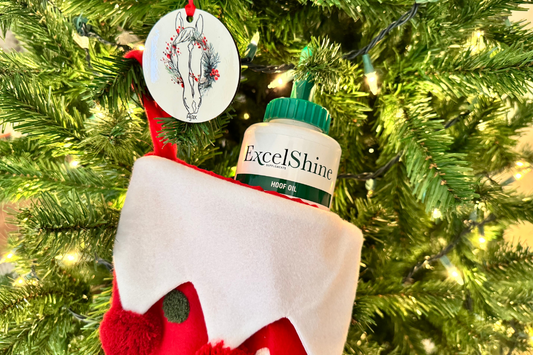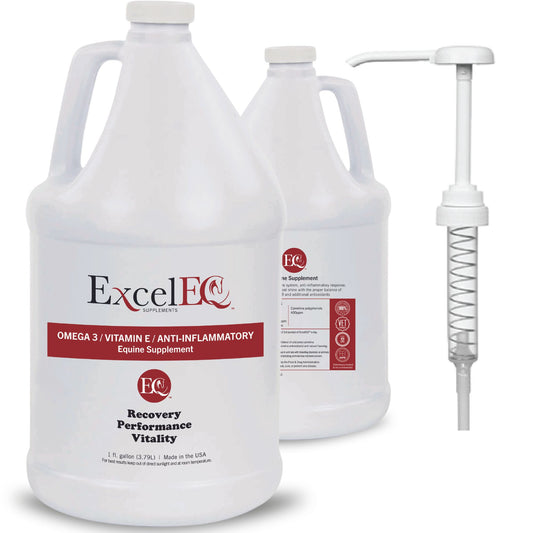ProElite Oil Supplementation on Lactate Values
Share
Affect of ProElite Oil Supplementation on Lactate Values during Endurance Race Competition
Background:
Blood lactate is one of the most often measured parameters during clinical exercise testing as well as during performance testing of athletes both human and equine alike. During exercise, the body uses oxygen to break down glucose for energy. During intense exercise, there may not be enough oxygen available to complete the process. At this exercise intensity, the body can convert lactate to energy without using oxygen. However, reverting to this pathway, lactate builds up in the bloodstream faster than it is burned off. While elevated blood lactate may be indicative of ischemia or hypoxemia, it may also be a “normal” physiological response to exertion. Thus, the blood value is a good marker of exercise tolerance and exertion. A “good” or “trained” athlete will exhibit a lower lactate than a “poor” or “untrained” athlete at any absolute intensity above resting (Goodwin et al, 2007).
This pilot study was performed to assess the benefit of supplementing an omega-3 rich supplement, Excel ProElite oil, to endurance athletes using lactate blood values for measuring fitness. Omega-3 fatty acids are a family of essential fatty acids with many biological activities. These fatty acids are incorporated into cell membranes, changing their structural and functional characteristics. There is some evidence in people that an increased concentration of omega-3 fatty acids in muscle cell walls trigger higher elasticity, flexibility and lower risk of physical damage to muscle tissue during exercise (Lembke et al, 2014). Omega-3 fatty acids also modulate inflammatory responses at different levels in cellular metabolism. ProElite, is a camelina-based omega-3 oil supplement with the addition of olive triterpenes for additional antioxidant support.
Objective:
To gather data before and after ProElite oil supplementation in equine endurance athletes by comparing pre and post-race blood lactate values.
Methods and Materials:
Three horses of Arabian breeding were used to study the effects of Excel ProElite oil supplementation on the metabolic response during endurance race competition. At race 1, all three horses were naive to omega-3 supplementation. Following completion of race 1, the study horses were fed 2 ounces of Excel ProElite oil each day during the 6-week period between race 1 and race 2. Two horses competed at a distance of 25 miles at both races and one horse competed at a distance of 50 miles at both races. The location was the same for race 1 and race 2 although some differences in course did exist. Blood lactate values were pulled at vet-in, approximately 12 hours prior to racing and again upon completion of the races, between 3-4 hours post finish time.
Results:
Lactate values were positively affected by omega-3 oil supplementation. At race 1 the post-lactate values were higher than the pre-race values by an average of 0.3mmol/L, indicating an increase in muscle exertion. After 6 weeks of ProElite supplementation, post-race blood lactate values were on average 0.1mmol/L less than pre-race values which is an excellent indication of optimal endurance health. Blood lactate is a value commonly used to assess athletic condition. The improvement noted in all 3 horses’ lactate recovery values during race 2 was an impressive feat, and indicative of good conditioning and an excellent metabolic state.
Conclusion:
Results of this study suggest that addition of ProElite oil to the diet alters exercise metabolism in conditioned horses in a positive fashion. This study demonstrated that after 6 weeks of supplementation with ProElite oil, endurance horses were able to speed up the dissipation of lactic acid in the bloodstream as compared to racing without prior supplementation.
References
- Goodwin, M. L., Harris, J. E., Hernández, A., & Gladden, L. B. (2007). Blood lactate measurements and analysis during exercise: a guide for clinicians. Journal of diabetes science and technology, 1(4), 558–569. doi:10.1177/193229680700100414
- Lembke, P., Capodice, J., Hebert, K., & Swenson, T. (2014). Influence of omega-3 (n3) index on performance and wellbeing in young adults after heavy eccentric exercise. Journal of sports science & medicine, 13(1), 151–156.






